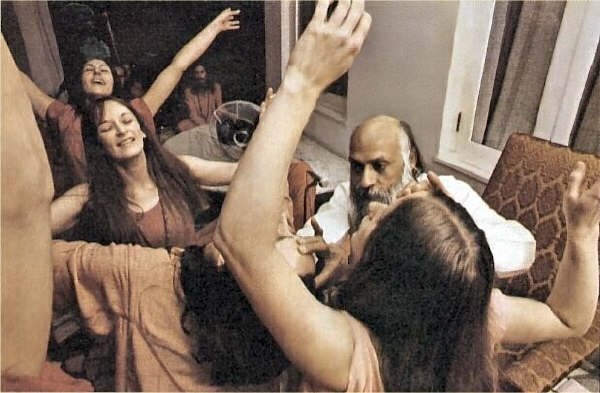SAT-CHIT-ANAND … MEANING OR NO MEANING, JUST THE SOUND OF IT TOUCHES MY HEART DEEPLY.
Sat-chit-anand is included in those few words of all the languages of the world which have descended from the highest peak of consciousness. They are pure music, they are absolute poetry, they are no ordinary words. And if they touch your heart without even knowing the exact meaning, the reason is that they are re-echoing the soundless sound of those who have entered into that space.
Sanskrit can be proud that it has never been a living language used in the marketplace. Sanskrit lovers try to prove just the contrary. They try to prove that once it was a living language in which people talked, just like any other ordinary dialect. But I insist on my difference.
I want to know why their insistence is for Sanskrit to be a living language used by ordinary people. They think if a language is not used by ordinary people then it loses something of importance, it is a dead language. Certainly it has never been used by the people, but it is not a dead language.
It is a language of the mystics. It is the language of those who know. It is not worldly, that's true. It is something otherworldly, and this is not a criticism. In fact, this is the extraordinariness of the language, that it was only used by a very few people of tremendous understanding. Their each word has immense significance, because it is coming out of a deep experience of reality of their own being.
The so-called living languages are mundane. They are for the marketplace, for day-to-day use: naturally, they cannot contain something of the beyond. Perhaps Sanskrit is the only language … and it is also the mother language of all the civilized languages of the world.
It is rare in the sense that the people who formulated it were not thinking of the material side of existence, but were more concerned that the words used would reflect something of consciousness, heights of consciousness, of love, of compassion, of ecstasy. Their words are mantras, sacred. They are coming from the very source of our life. It is possible.
Vimal, you say, "sat-chit-anand … Meaning or no meaning, just the sound of it touches my heart deeply." It is a soundless sound; or, in other words, the sound of silence, the sound of ultimate experience, the sound when you are no more — only the universe remains. Certainly you can avoid meaning. You can say "meaning or no meaning," because meaning is of the mind.
But Sat-Chit-Anand has a significance which goes far higher than meaning. It is just a fragrance which has left the flower. The flower is visible — part of this world, part of matter — but the fragrance, you cannot catch hold of it. You can feel it, it can touch you deeply. It can reach to your innermost core, but still you cannot figure out the meaning of it. You cannot figure it out, what it is in reality.
The meaning is irrelevant here; significance becomes the relevance. Not that it has no meaning, but basically it has only significance. And the significance is that the very sound, Sat-Chit-Anand penetrates into the heart, breaking all the barriers and all the bars and all the defense measures. It resounds within your being, creating a subtle harmony, a deep peace, a strange feeling of fulfillment, of being at ease with the world, with the universe, with existence itself — at ease not only with existence, but with yourself too.
It is a pure silence, as if water can be condensed into ice, and the ice can be again melted into water. That is the reality of such beautiful sounds. They can be condensed into meaning, but their basic reality is to melt within you and to reach to each fiber of your being, to each cell, to give it a dance.
These are the mystic sounds. They are very few.
I have talked to you about " Satyam-shivam-sundram, Sat-chit-anand, Hari om tat sat, Om mani padme hum, Om-shanti-shanti-shanti.
These five I have chosen as the most significant, as the most deep-going. I will try to give you the meaning also, because that meaning will help the significance to become deeper. That meaning will not only touch your heart, it will also touch your intelligence. And you have to be touched in your totality to be transformed.
I will begin with the last one. That is the sound every Eastern scripture ends with … om-shantih-shantih-shantih. It means "The soundless sound, or the sound of silence: peace … peace … peace …" Just giving you the sense of the whole scripture in these few telegraphic words. Every scripture in the East ends with the same. It may be Hindu, it may be Buddhist, it may be Jaina — it doesn't matter.
They are all different in their philosophies. They are all different in their theologies. They are different religions continuously in controversy for at least ten thousand years. But strangely, they all end their scriptures with the sound of silence: peace … peace … peace … It seems they are all different roots of this experience.
They may differ about their roots, about the description of their roots. They may quarrel, they may contradict each other, but as far as the end is concerned, when they reach to the highest peak of consciousness, all that is found is the sound of silence and utter peace, so deep that they have to repeat it three times: peace … peace … peace …
The fourth is used by the Tibetans, although it takes almost all the words from Sanskrit: om mani padme hum. It is a very mystic statement. It says, "The diamond in the lotus … the sound of silence." You cannot conceive a more beautiful thing than a beautiful diamond in the most beautiful flower on the earth, the lotus. They are trying to convey to you the beyond in some way comprehensible to the mind: the sound of silence — om — the diamond in the lotus. I have loved it from my very childhood. Just the words, "the diamond in the lotus …" They have managed in the most beautiful way to express the beyond.
And the third is hari om tat sat: "the sound of silence … this is the only truth."
And the second is, sat-chit-anand: "truth, consciousness, bliss."
And the first is, satyam-shivam-sundram: "truth, godliness, beauty."
These five I can say to you belong to the universal religious consciousness, not to any organized religion, because they have come from individual mystics. They have poured their heart, they have poured their enlightenment, they have poured their awakening into these five mantras.
There is no word in English to translate mantra. It means a sacred word, not of any use in the day-to-day life experiences, but only significant when you go beyond this visible world and enter into the invisible consciousness. A mantra is a secret key. It opens the door to the ultimate.
But the meaning is also significant, because you are in the mind. The sound may have gone deeper into your heart, thrilled you, but still it is good not to leave the mind completely out of your experience; because it can become a disturbance, it can become very vengeful.
Don't antagonize your mind. It can disturb everything. Have you watched how it disturbs your body? When you are in anger your whole body is disturbed: your stomach is disturbed, your blood pressure goes high, you start suddenly perspiring — even in an air-conditioned place. There have been many cases of heart attack in intense anger. The heart suddenly stops. The mind can disturb the body on one hand: it can disturb the heart on another hand. Very few people know its disturbances in the heart because that is not a common experience.
But if you don't know the meaning, if the mind is not satisfied, soon it will start creating suspicion, doubt, skepticism. Soon it will start saying to you that you are being irrational, and you will be affected. And the impact of Sat-Chit-Anand on your heart will start disappearing if the mind is not in cooperation.
My whole effort is to transform your total being, not leaving anything outside, because nature does not intend it so. And when the mind can be persuaded to go along with you, there is no need to create an opposition. I am against creating any kind of unnecessary conflict and split in your being. It is better to create a bridge between mind, body and being.
And the meaning is also tremendously beautiful. Sat means truth. And the longest search of man has been for that, because without knowing the truth, we know nothing. Truth is the very meaning of our existence. Without knowing truth we are just accidental, we don't have any meaning.
Perhaps something has gone wrong in nature and we are the product of it — freaks. Unless you know the meaning of yourself, you cannot have a deep relationship with the cosmos. The meaning is going to become a bridge with the cosmos. And unless you feel some meaning, some truth in your being, you are not yet aware of a deep communion with the whole.
Truth is the experience of being in deep communion with the eternity of existence, and with the wholeness and the perfection and the grandeur and the magnificence of that which is.
Truth simply means that which is.
It is pure isness.
And the revelation of this truth to you is only possible if your chit, your consciousness, rises to its ultimate flowering.
It is consciousness that is going to discover the truth. Hence, meditation is emphasized. Meditation will not give you the truth, it will give you more and more consciousness, and finally, consciousness gives you two things: on one hand, truth, and on the other hand, a tremendous bliss. You become almost like a bird with two wings. Truth is your one wing, bliss is your other wing. And you are pure consciousness.
In this experience you can fly like an eagle across the sun into the unknown. Then this whole universe belongs to you. Then wherever you are, you are at home. Then whatever you are, you are in utter peace. Then whatever happens is beautiful and brings tremendous gratitude to you.
Prayer becomes your very heartbeat. You don't pray in synagogues and in churches and in temples and mosques. Those are for the irreligious. Those are for the hypocrites. Those are for the pretenders. The authentic religious man has prayer in his heartbeats. He is continuously feeling a tremendous gratitude to all that existence has made available to us — life … love … laughter …
OSHO


